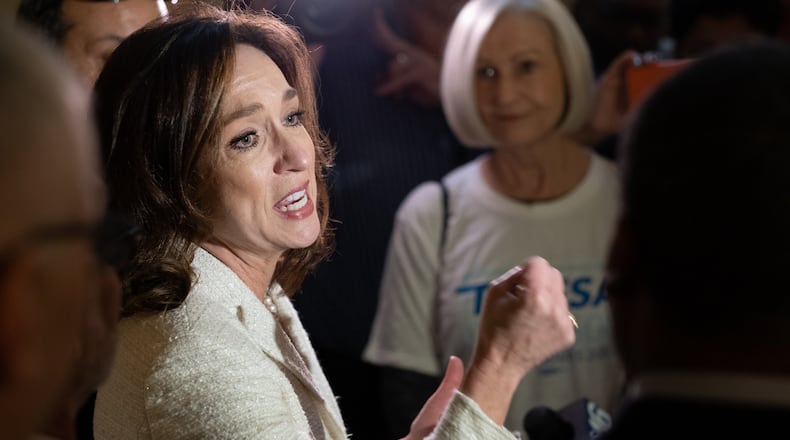Teresa Tomlinson’s top Democratic opponents may have entered the race for the U.S. Senate with more name recognition or fundraising ability. But she’s relentlessly emphasized the facet of her resume that both her top rivals lack: experience in elected office.
At every virtual town hall and candidate forum, Tomlinson brings up her role as a former two-term mayor of Columbus and public safety director of the west Georgia city to distinguish herself from rivals in the bid to challenge U.S. Sen. David Perdue.
And she’s forcefully tried to make the case that she’s the only Democrat in the race who can go toe to toe with Perdue, a former Fortune 500 chief executive and ally of President Donald Trump’s, without getting steamrolled.
“All candidates are not created politically equal. We absolutely must nominate someone who’s won elections and governed — and governed well,” she said. “I’m the only candidate in the field who can bring in the voters we need from outside metro Atlanta.”
>> Guide: Where U.S. Senate Democratic candidates stand on the issues
>> Related: In Senate run, Amico relies on experience in business, past election
>> Related: Ossoff applies lessons from 2017 loss to bid this year for U.S. Senate
Since entering the race hours after Stacey Abrams declined to run, Tomlinson has presented herself as a liberal candidate who can also appeal to parts of rural Georgia where Democrats have long struggled.
In a campaign memo telegraphing her strategy, Tomlinson said Abrams’ narrow defeat in 2018 showed that “winning Atlanta and its suburbs is not quite enough” and that her roots in Middle Georgia would “help to expand the Abrams model and increase the likelihood of defeating Perdue.”
She’s racing for a spot in a likely runoff against two top rivals in a seven-candidate field. Jon Ossoff, the owner of an investigative journalism firm who ran unsuccessfully for Congress in 2017, is leading the polls. And Sarah Riggs Amico, the 2018 nominee for lieutenant governor, is trying to energize union supporters.
The scant public polling shows a high proportion of undecided voters, and the coronavirus pandemic has made the contest even more unpredictable. And Tomlinson is trying to win over the uncertain by more aggressively critiquing her two top opponents.
In one debate, she pointedly questioned Amico's past contributions to Republican candidates, wondering aloud whether former President Barack Obama knew about her support for Mitt Romney when he endorsed Amico in the midterm.
In another, she referenced an internal GOP poll that showed Ossoff narrowly trailing Perdue, saying that his widespread name recognition from his nationally watched race for a suburban U.S. House district doesn’t make Georgians “want to vote for you.”
“How can we afford to make you our nominee when you lack public service experience, couldn’t win your home district and have very little statewide appeal?” she asked.
(He retorted that the surveyors “didn’t even bother polling your name in that poll.”)
‘In the trenches’
A Brookhaven native, Tomlinson grew up a Republican in part because of a close family relationship with then-state legislator Max Davis. She later volunteered for U.S. Sen. John Warner, the five-term Virginia Republican, and worked for Ronald Reagan’s 1984 campaign.
But she switched parties within years, disillusioned with the GOP’s conservative tilt, and she moved to Columbus in 1994 to practice law shortly after she graduated from Emory University’s law school.
Her entry into the city’s politics came in 2006 when she became executive director of MidTown Inc., a nonprofit with a mission to improve a struggling section of Columbus. When the incumbent mayor decided against running in 2010, she emerged from a crowded field and defeated a perennial candidate in the runoff.
On the campaign trail, Tomlinson highlights a budget overhaul she engineered in Columbus that cut spending on pension plans and efforts to reduce crime. She also faced a lawsuit from four elected officials claiming she manipulated the budgets they submitted for their agencies, a legal battle she won.
“I can actually level direct examples of instituting criminal justice reform, of saving a pension, of completely reforming the health care system for indigent participants,” she said at a recent event.
Like her top Democratic rivals, her platform is liberal. Tomlinson wants to provide a “public option” to let people buy coverage in a government-run health care plan, supports the Green New Deal plan to combat climate change and backs the decriminalization of marijuana.
She says she will work to abolish the federal death penalty and scale back mandatory minimum prison sentences, as well as oppose anti-abortion legislation and only vote to confirm federal judges who consider the Roe v. Wade decision a matter of settled law.
As she pitches all these proposals, she says her experience in Columbus’ top office proves she can help enact them, too.
“I’m the real deal,” she told a group of voters in a virtual meeting. “We’ve been in the trenches through actually having governed. We’re going to need someone who’s actually had a hand on the levers of government and made them work for people.”
About the Author
Keep Reading
The Latest
Featured





